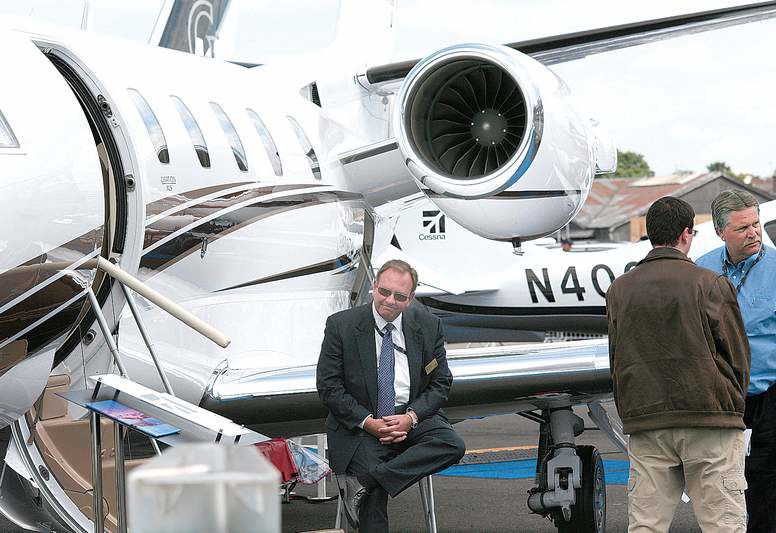Jet sales drop in U.S., and gas isn’t to blame
Published 5:00 am Saturday, July 19, 2008

- A salesman with Cessna takes a break Tuesday during the Farnborough International Air Show. Manufacturers of private jets said this week they are seeing signs that interest in the American market is beginning to soften.
FARNBOROUGH, England — Given the misery of air travel these days, private jet makers may seem to have a built-in selling point, particularly among customers in the United States.
But manufacturers at the Farnborough International Air Show said this week that they were seeing the signs that private jet sales in the U.S. market were beginning to soften.
The U.S. market, traditionally the world’s biggest for business jets, has slipped well below 50 percent of global sales in recent months, according to Honeywell, the world’s largest maker of avionics, the systems that are used to run planes.
At the end of 2007, U.S. sales made up just 30 percent of global jet sales, Honeywell’s data showed.
That slump is attributed to worries about the American economy and the growth of other markets, like Russia, South Asia and the Middle East. Interestingly, manufacturers say the price of jet fuel, which has nearly doubled from a year ago, is not much of a factor.
To be sure, the drop is a recent development for the U.S. market, which dominated jet sales for a decade. Makers of private jets — Bombardier of Canada, Dassault Aviation in France and Embraer of Brazil — are watching the market carefully.
“Already, we are seeing a slowdown in business jets in the United States,” Federico Curado, the chief executive of Embraer, said at the Farnborough air show, outside London.
Pierre Beaudoin, the chairman of Bombardier, which makes the Learjet and the longer-range Global Express private jet, said he noticed a “softening” of the American market in April, though he stopped short of calling it a slowdown.
“The United States is still growing, but its significance as a market has been reduced,” David Dixon, head of business aircraft for the Asia-Pacific region at Bombardier, said.
“The initial indicator is in the charter market — that is increasing — discretionary calls to charters have shown some change,” Dixon said.
In times of economic uncertainty, customers may hold off buying an aircraft, choosing to charter a plane or sign up with a fractional ownership company like NetJets, which allows them to buy travel time on corporate jets.
The situation is a sharp contrast to past air shows, where potential customers flocked to see the latest technology and cabin features.
At the Paris Air Show in 2005, executives stood in line in the rain to see Bombardier’s Global 5000, a luxury jet likened to a Porsche among Volkswagens. Back then, private jet sales were thriving and manufacturers boasted about billion-dollar backlogs.
Private jet sales have softened once before in this decade. In 2000, many buyers canceled orders after the technology bubble burst, causing double-digit declines for jet sales. They began to rebound after the September 2001 attacks, when tightened security prompted many companies to put their executives on private planes.
Executives at Farnborough said the business jet market was less directly susceptible to oil price fluctuations, since customers are typically wealthy and chief executives of corporations — though cost-cutting could eventually hit them also.
But Curado said that financing was becoming more difficult for private plane purchases, which could be a concern given that Embraer is rolling out more business jets. At Farnborough, Embraer showed its Legacy 600 executive jet that can carry 14, as well as a mock-up for a new jet, the Phenom, and a cross-section of another plane, the Lineage, a bigger luxury jet.
“The first signal of a downturn is demand for new jets,” Curado said. “The second is financing for planes already on order, and the third level of problems is cancellations or deferrals.”
“So far, credit today is much more selective than a year ago,” he said “it’s not as easy as six months ago to finance new aircraft.”
That could benefit companies able to pay cash or arrange their own financing, especially those in growth markets like the Middle East and Russia.
Even so, American companies will continue to use private jets for ferrying executives whose time is valuable, said Robert Mann Jr., an airline industry analyst in Port Washington, N.Y.
“Scheduled airline travel no longer meets their needs,” Mann said.








